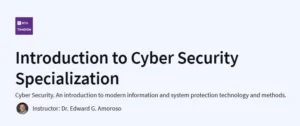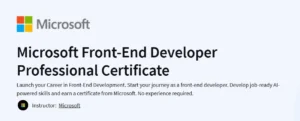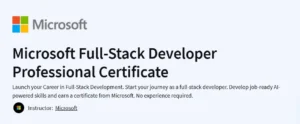What you will learn in Algorithms Specialization Course
- Understand fundamental algorithms and their applications
- Learn problem-solving approaches like divide-and-conquer, dynamic programming, and greedy algorithms
- Analyze algorithm efficiency using Big-O notation
- Explore graph algorithms including shortest paths and spanning trees
- Tackle NP-complete problems and approximation techniques
- Build strong theoretical and practical algorithmic skills
Program Overview
Divide and Conquer, Sorting and Searching, and Randomized Algorithms
⏱️ 1 week
- Learn asymptotic analysis and algorithm efficiency
- Master divide-and-conquer strategies and sorting/searching algorithms
- Explore randomized algorithms for performance optimization
Graph Search, Shortest Paths, and Data Structures
⏱️ 1 week
- Use BFS and DFS for graph exploration
- Study Dijkstra’s and Bellman-Ford algorithms
- Understand heaps, stacks, queues, and balanced trees
Greedy Algorithms, Minimum Spanning Trees, and Dynamic Programming
⏱️1 week
- Solve optimization problems using greedy strategies
- Learn Kruskal’s and Prim’s algorithms
- Implement dynamic programming for complex problems
Shortest Paths Revisited, NP-Complete Problems and What To Do About Them
⏱️ 1 week
- Delve into advanced shortest path algorithms
- Grasp the concept of NP-completeness
- Explore practical approaches to intractable problems
Get certificate
Job Outlook
Highly relevant for roles in software engineering, data science, and tech research
Strengthens core skills required for technical interviews
In demand by top tech firms for algorithm-heavy roles
Lays a solid foundation for advanced CS fields like machine learning and AI
Certification from Stanford boosts professional credibility
Equips learners to contribute to efficient, scalable systems design
Explore More Learning Paths
Take your algorithmic skills further with these related courses and resources. From foundational strategies to advanced techniques, these learning paths will help you tackle computational challenges with confidence.
Related Courses
Algorithms on Strings
Focus on string-based algorithms, essential for text processing, bioinformatics, and coding problem-solving.Advanced Learning Algorithms
Explore complex algorithmic techniques and learn how to apply them efficiently to real-world problems.Algorithmic Toolbox
Develop practical problem-solving skills and master algorithmic strategies for coding interviews, competitions, and professional applications.
Related Reading
What Is Python Used For
Discover how Python implements algorithms for a wide range of applications, from data processing to advanced computational tasks.
Specification: Algorithms Specialization Course
|
FAQs
- Not necessarily—basic comfort with programming and logical reasoning is more important.
- You’ll work with asymptotic analysis (Big-O notation) to evaluate efficiency—but it’s taught clearly, not deeply mathematical.
- The course emphasizes problem-solving approaches like divide-and-conquer, greedy, and dynamic programming—these concepts build on logic, not advanced calculus.
- Graph algorithms (like Dijkstra’s and Bellman-Ford), NP-completeness, and approximation strategies are introduced, but with practical focus over heavy theory.
- If you’re already comfortable coding and understanding algorithm behavior, you’ll manage fine; theoretical CS depth isn’t the centerpiece.
- Each of the four main modules is designed to be covered in about one week on this platform.
- So a fast-paced learner could finish everything in around 4 weeks.
- If you want more time for reflection or practice, pacing it out over 8–12 weeks may be more comfortable.
- The specialization offers lifetime access, so you can go at your own pace, pause, and return anytime.
- A realistic plan might be: 3–5 hours per week to absorb concepts and complete quizzes, or more if you’re coding intensively.
- Course 1: Dive into divide-and-conquer techniques, sorting/searching algorithms, and randomized approaches. You’ll learn asymptotic (Big-O) analysis and algorithm efficiency.
- Course 2: Focuses on graph traversal (BFS, DFS), shortest path algorithms (like Dijkstra’s and Bellman-Ford), and fundamental data structures—heaps, stacks, queues, balanced trees.
- Course 3: Teaches greedy algorithms (including MST via Kruskal’s and Prim’s) and dynamic programming for optimization problems.
- Course 4: Explores advanced shortest paths, introduces NP-complete problems, and practical ways to cope with intractable problems—like approximation techs.
- Across these modules, expect a mix of conceptual explanations and coding exercises (implementation of the algorithms), though exact formats (quizzes, assignments) align with Coursera’s usual interactive style.
- Yes—learning these core algorithm strategies and understanding their trade-offs is absolutely key to acing tech interviews.
- The content—sorting, graphs, dynamic programming, NP-completeness—is frequently asked in interviews.
- This specialization puts emphasis on the design and efficiency of solutions, which gives you the reasoning skills behind the code.
- Natural fluency with terminology (like greedy vs dynamic, MSTs, BFS/DFS) comes up often in interview conversations.
- You’ll get comfortable not just with coding, but with explaining why your solution works and how it performs.
- The Stanford specialization strikes a strong balance between theoretical clarity and conceptual depth—ideal for understanding algorithm design approaches and efficiency.
- The Princeton courses (Algorithms Part I & II) are very detailed and Java-focused, with many programming assignments and deeper CS theory.
- The UC San Diego + HSE specialization (Data Structures and Algorithms) pushes hands-on implementation via ~100 coding problems, leaning more toward interview-style practice.





